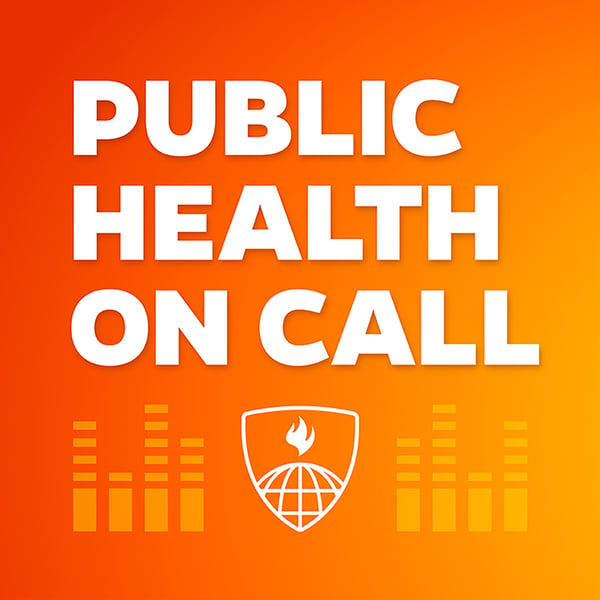932 - Cuts to mRNA Vaccine Development
Public Health On Call
The Johns Hopkins Bloomberg School of Public Health
4.8 • 620 Ratings
🗓️ 13 August 2025
⏱️ 16 minutes
🧾️ Download transcript
Summary
About this episode:
The Department of Health and Human Services has cancelled nearly $500 million in funding for the development of mRNA vaccines, including for vaccines against potential new pandemic threats. In this episode: Professor Bill Moss delves into the misinformation surrounding mRNA vaccines, explains their potential to treat diseases like cancer and HIV, and warns of the national security threats posed by cuts to development.
Guest:
Dr. Bill Moss, MPH, is an infectious disease specialist and the executive director of the International Vaccine Access Center at the Johns Hopkins Bloomberg School of Public Health.
Host:
Stephanie Desmon, MA, is a former journalist, author, and the director of public relations and communications for the Johns Hopkins Center for Communication Programs.
Show links and related content:
-
Johns Hopkins expert speaks on ripple effect of federal cuts to mRNA vaccine contracts—WBAL-TV 11
-
How Cuts to mRNA Vaccine Development Will Set the U.S. Back—Johns Hopkins Bloomberg School of Public Health
-
What to know about mRNA vaccines as Trump admin pulls funding—Axios
-
For mRNA Vaccines, COVID-19 Is Just the Beginning—Johns Hopkins Bloomberg School of Public Health
Transcript information:
Looking for episode transcripts? Open our podcast on the Apple Podcasts app (desktop or mobile) or the Spotify mobile app to access an auto-generated transcript of any episode. Closed captioning is also available for every episode on our YouTube channel.
Contact us:
Have a question about something you heard? Looking for a transcript? Want to suggest a topic or guest? Contact us via email or visit our website.
Follow us:
-
Here's our RSS feed
Note: These podcasts are a conversation between the participants, and do not represent the position of Johns Hopkins University.
Transcript
Click on a timestamp to play from that location
| 0:00.0 | Welcome to Public Health On Call, a podcast from the Johns Hopkins Bloomberg School of Public Health, |
| 0:05.5 | where we bring evidence, experience, and perspective to make sense of today's leading health challenges. |
| 0:16.0 | If you have questions or ideas for us, please send an email to public health question at jh.h.u. |
| 0:22.6 | That's public health question at jh.u.edu for future podcast episodes. |
| 0:30.6 | Hey listeners, it's Lindsay Smith Rogers. Today, the recent announcement by the Health and Human Services Secretary that he will cancel |
| 0:38.3 | $500 million in awards to researchers developing MRNA vaccines, the type of vaccines that |
| 0:44.6 | allowed the rapid, life-saving development and deployment of COVID vaccines during the pandemic. |
| 0:50.4 | Dr. Bill Moss, a Johns Hopkins vaccine expert, returns to the podcast to talk with Stephanie Desmond about what could be tragic consequences for public health and emergency preparedness. Let's listen. |
| 1:02.1 | Bill Moss, thanks so much for joining me on public health on call. |
| 1:05.5 | Good to be with you again, Stephanie. |
| 1:07.6 | Bill, we have to talk about this elephant in the room. Last week, the health secretary |
| 1:12.2 | Robert F. Kennedy Jr. announced he was canceling nearly $500 million in grants and contracts for |
| 1:18.6 | developing mRNA vaccines. So let's break this down. First, what is an MRI vaccine and why is this |
| 1:26.1 | important? So first, in terms of tackling that question, let's talk a little bit about what our more |
| 1:33.5 | standard vaccines are and then compare the MRNA vaccines to those. |
| 1:39.1 | So first of all, I like to think of vaccines as trainers. |
| 1:43.4 | They're trainers of our immune system, much like an athlete or a musician needs to train. |
| 1:50.2 | What we're trying to do with vaccines is train our immune system to recognize and respond very quickly to a pathogen, whether that's a bacteria or a virus or even the protozoa that |
| 2:03.5 | cause malaria. And so we're trying to train our immune system by exposing that our immune |
| 2:10.3 | system to some of the parts, all are parts of a particular pathogen, so that when, if we're actually infected with that |
| 2:19.0 | pathogen, again, a virus or bacteria, our immune system can respond much more quickly and get a |
| 2:25.3 | jump and defeat that pathogen and minimize our risk of disease. So we have a long history of |
... |
Transcript will be available on the free plan in 14 days. Upgrade to see the full transcript now.
Disclaimer: The podcast and artwork embedded on this page are from The Johns Hopkins Bloomberg School of Public Health, and are the property of its owner and not affiliated with or endorsed by Tapesearch.
Generated transcripts are the property of The Johns Hopkins Bloomberg School of Public Health and are distributed freely under the Fair Use doctrine. Transcripts generated by Tapesearch are not guaranteed to be accurate.
Copyright © Tapesearch 2025.

